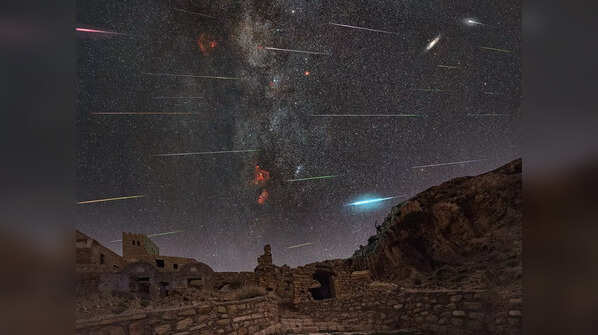
1/11
Dazzling up the night sky
Meteor showers have always fascinated stargazers and photographers alike. NASA’s Astronomy Picture of the Day (APOD) has captured some of the most breathtaking images of these celestial events. Here, we explore ten of the most dazzling meteor shower photos shared by NASA, each showcasing the beauty and wonder of the night sky.
Image: Makrem Larnaout/NASA/APOD
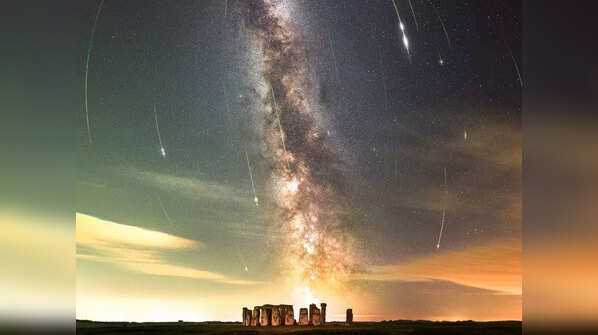
2/11
Perseid Meteors over Stonehenge
Captured on August 12, 2024, this image by Josh Dury features the Perseid meteor shower over the iconic Stonehenge in Wiltshire, England. The photo combines multiple exposures to show numerous meteors streaking across the sky, with the Milky Way providing a stunning backdrop. The Perseids, known for their bright meteors, peak in mid-August and are one of the most popular meteor showers for observers in the Northern Hemisphere.
Image: Josh Dury/NASA/APOD
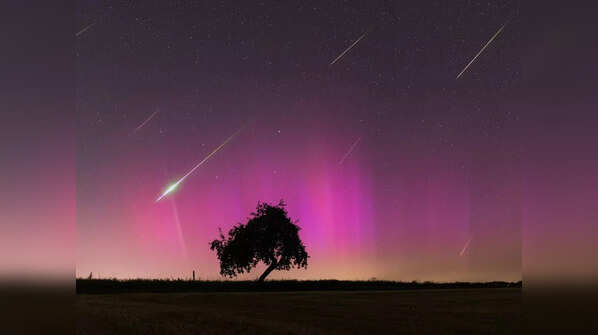
3/11
Meteors and Aurora over Germany
On August 14, 2024, Chantal Anders captured a spectacular image of meteors and aurora over Ense, Germany. This composite image, built from seven exposures taken over 26 minutes, shows the Perseid meteor shower combined with a rare auroral display. The red-blue hue of the aurora was caused by an explosion of particles from the Sun, making this night sky event even more extraordinary
Image: Chantal Anders/NASA/APOD
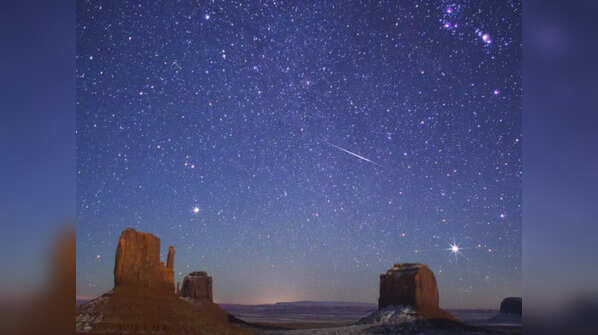
4/11
Geminid Meteors over Monument Valley
This stunning image, taken on December 12, 2009 by Wally Pacholka, captures the Geminid meteor shower over Monument Valley in the United States. The photo shows multiple meteors radiating from the constellation Gemini, with the iconic rock formations of Monument Valley in the foreground. The Geminids are known for their bright and colorful meteors, which peak every December.
Image: Wally Pacholka/NASA/APOD
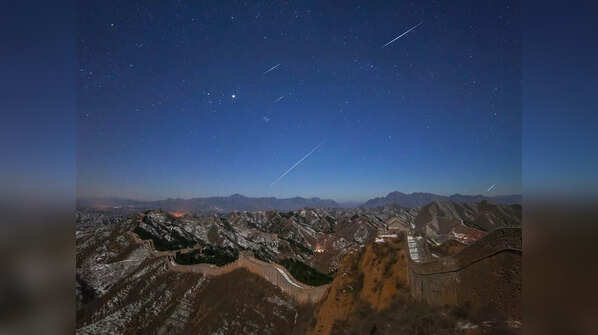
5/11
Quadrantid Meteors over China
On January 3, 2020, Cheng Luo photographed the Quadrantid meteor shower over the Great Wall of China. The image captures several meteors radiating from the constellations Boötes and Draco, with the ancient wall stretching across the foreground. The meteor shower dazzled the night skies over this ancient monument.
Image: Cheng Luo/NASA/APOD
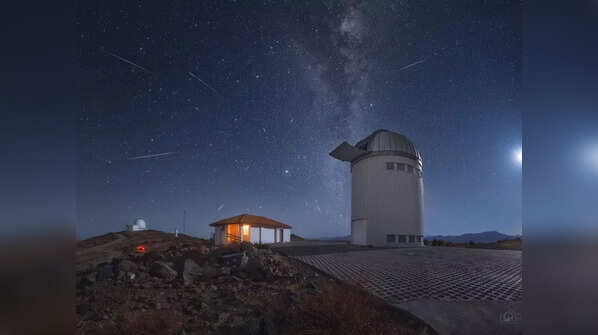
6/11
Lyrid Meteors over the Atacama Desert
Yuri Beletsky captured this breathtaking image of the Lyrid meteor shower over the Atacama Desert in Chile on April 27, 2017. The photo features a bright meteor streaking across the sky, with the Milky Way and the Southern Cross constellation visible in the background and the famous Las Campanas Observatory gracing the foreground. The meteors were a dazzling sight to observe and one for the history books.
Image: Yuri Beletsky/NASA/APOD
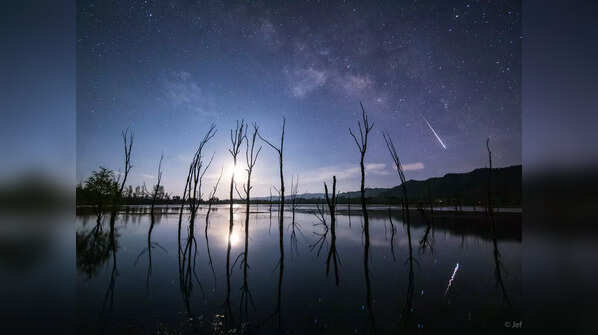
7/11
Lyrid of the Lake
On April 24, 2022, a bright Lyrid meteor was captured flashing along the central Milky Way over Lake Nian in Yunnan province, China. This image, taken by Jeff Dai, shows the meteor casting a bright reflection across the lake. The Lyrid meteor shower, one of the oldest known, is active in late April and is associated with the long-period comet Thatcher
Image: Jeff Dai/NASA/APOD
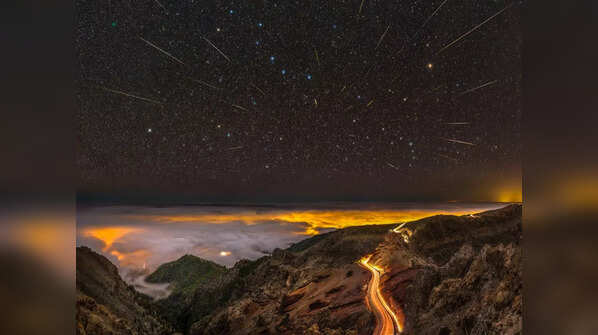
8/11
Meteors, Comet, and Big Dipper over La Palma
This image, taken on January 4, 2019, captures the Quadrantid meteor shower from La Palma, one of Spain’s Canary Islands. The composite image shows meteors radiating from the constellation Boötes, with the faint green coma of Comet Wirtanen visible below the handle of the Big Dipper. The Quadrantids are known for their short, intense peak, producing up to 120 meteors per hour
Image: Vincent Duparc/NASA/APOD
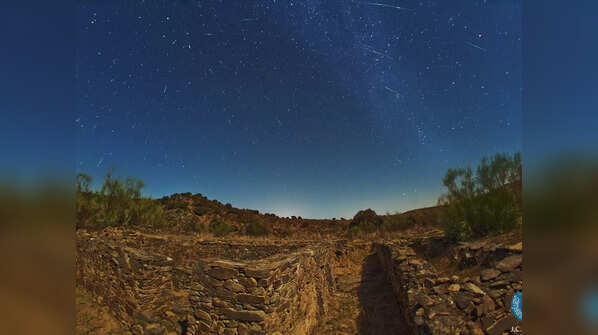
9/11
Draconid Meteors over Spain
On October 8, 2011, Juan Carlos Casado captured the Draconid meteor shower over the Celtic ruins of Capote in Badajoz province, Spain. The composite image shows numerous meteor streaks over 90 minutes, with the meteors radiating from the constellation Draco. The Draconids are known for their variable activity, with some years producing spectacular displays
Image: Juan Carlos Casado/NASA/APOD
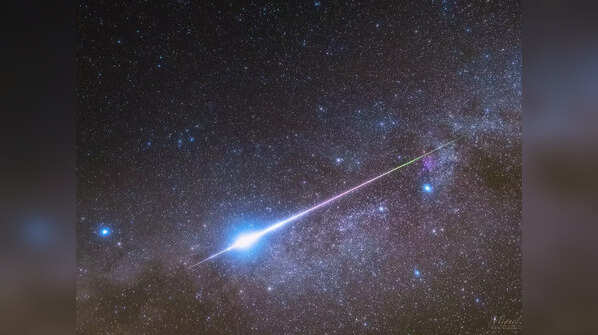
10/11
Bright Meteor, Starry Sky
Captured on August 12, 2021, by Miguel Claro, this image shows a bright Perseid meteor streaking along a starry Milky Way in Portugal. The meteor’s colorful trail starts near Deneb and ends near Altair, two of the brightest stars in the northern summer triangle. The Perseid meteor shower, known for its bright meteors, peaks in mid-August
Image: Miguel Claro/NASA/APOD
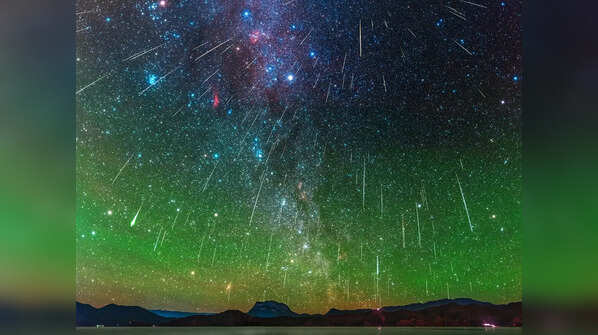
11/11
Geminids from Gemini
This image, taken on December 14, 2020 by Wang Jin, captures the Geminid meteor shower with over 200 bright meteors streaking through the sky. The photo shows the meteors radiating from the constellation Gemini, with the debris originating from the unusual asteroid 3200 Phaethon. These Geminids produced one of the most reliable and spectacular meteor showers ever captured.
Image: Wang Jin/NASA/APOD
FOLLOW US ON SOCIAL MEDIA

 9 months ago
194
9 months ago
194




























 English (US)
English (US)